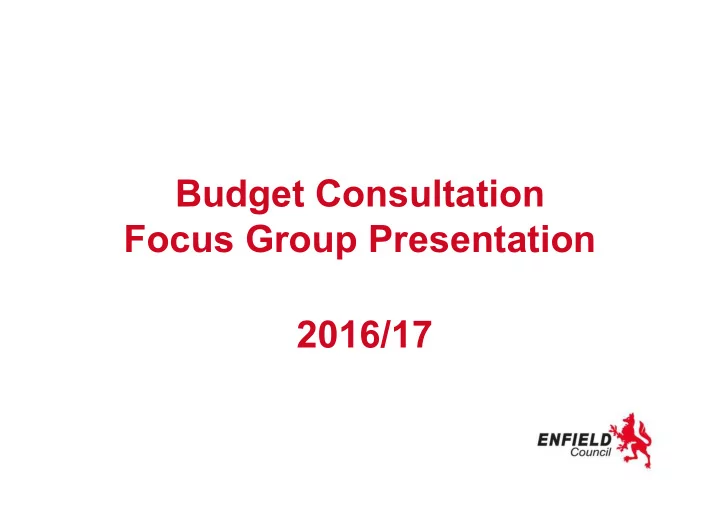

Budget Consultation Focus Group Presentation 2016/17
Agenda • Welcome • Purpose • Where the Council’s money comes from and where it is spent • Our approach to financial management • Pressures and risks • Budget Gap • Council Services included in the consultation • Council Tax information • Questions
Council Spend and Income 2015/16 (£m’s) Finance, Regeneration & Resources & Environment HRA Rents Concessionary Customer £56.3m £64.9m Other Income, Fares £11.8m Services Health, Corporate, £117.9m £52.4m Government Chief Executive Housing & £33.3m Funding £5.8m Adult Social Council Tax, Community £412.4m Care £129.0m £100.9m Housing £38.7m Schools & Children's Revenues & Benefits £300m Services £371.8m Local Business Rates £67.9m Housing Benefits HRA £64.9m £300.0m Gross Expenditure £1.064bn or £1,064,000,000
Government Core Funding Reductions 2010/11 to 2018/199 Cash - Government Funding v Funding after September RPI Adjustment 2010/11 to 2015/16 & Forecast RPI to 2018/19 @2% £m 200 180 191 174 170 160 163 165 157 140 147 146 120 127 129 117 108 100 111 99 100 80 90 81 60 40 20 0 10/11 11/12 12/13 13/14 14/15 15/16 16/17 17/18 18/19 Note: Figures excludes the specific grants of Dedicated Schools Grant, Public Health Grant and New Homes Bonus
Our Approach to Financial Management • Medium Term Financial Plan (MTFP): – Looks four years ahead – Gives as much stability and certainty as possible – Brings together all the Council’s day to day finances – Aiming to put in place a plan to deliver a balanced budget for a four year period • Firm control on finances: – Helps to focus on choices which need to be made – Enables delivery of services with minimum interruption
Pressures and Risks – Spending Review 2015 & Financial Settlement – further Central Government spending cuts. – Care Act 2014 – potential increase in care costs and additional responsibilities for the Council which are not fully funded by the Government. – Demographics – increase in demand for Council services due to population growth as well as an ageing population – Borrowing – increases in costs for new borrowing for capital investment (e.g. schools, roads and public realm). – Inflation / pay – increased cost of running services. – Upturn in property market – increase in the level of rents paid to landlords for temporary accommodation but not funded by Government under new welfare arrangements.
Cumulative Savings Targets over the Period of the Financial Plan £m's Savings already agreed New savings required 80 70 60 Cumulative New 50 Savings £50.5m Target 40 £39.1m 30 £26.8m 20 £16.9m Cumulative Savings 10 £20.7m £20.7m Already £14.7m Agreed £8.1m 0 2016/17 2017/18 2018/19 2019/20 Note that Budget Pressures over the period 2016/17 to 2019/20 total £71.2m. Saving of £20.7m have already been made from Enfield 2017 (back office savings) and the full year savings effect of prior year decisions, and these are being implemented. Therefore the remaining Savings Target is £50.5m to be met from new savings.
Service areas included in consultation Savings are being considered from all service areas including: • Adult Social Care • Health & Housing • Services for Children & Young People • Environment & Regulatory Services • Neighbourhood & Street Scene • Regeneration • Parks, Open Spaces, Leisure & Culture Which services would you prioritise?
Summary of Council Tax Options Potential Potential Potential Potential Options Saving Saving Saving Saving 2016-17 2017-18 2018-19 2019-20 £m £m £m £m Council tax Increases: The Council’s financial plan currently assumes a council tax increase of 1% and this is included in figures shown in slide 7 (Budget Gap). Higher increases would generate additional savings as follows: Increasing Council Tax by 1.99% each year would bring in an additional : 1.0 2.0 3.0 4.0 Increasing Council Tax by 3%* each year would bring in an additional : 1.5 3.5 5.5 7.5 *To increase Council tax above 1.99% currently requires a referendum of the local electorate at an estimated cost of £500k. This option includes the cost of the referendum. Lead in time to organise a referendum make it unlikely to be a viable option for 2016/17 unless done retrospectively which incurs a risk of a no vote which would result in re-billing and the associated costs.
Council Tax • How much do you feel you know about council tax? • Initial reactions to the amount of council tax you pay – is it too much? Is it fair? • A 1% council tax increase equates to a 21p per week increase per household based on a Band D property (Enfield charge only –excludes GLA) • To maintain services what level of council tax increase do you feel is fair?
Questions A Big Thank you
Recommend
More recommend